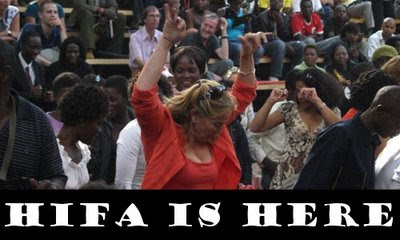Art Updates from Zimbabwe and Reflections on Dance & the Human Condition
Organizations like Pamberi Trust, Kubatana.org, artsinitiates, BWAZ and others based in Zimbabwe continue to function as helpful sources of arts and culture news. The artsinitiates publishing initiative is growing, and I am happy to report that they have just published a chapbook (monographs) of my stories, the Mukoma series. I am waiting for my copy,but a friend already told me over the phone that he had just received his copy. This is great since the stories were originally published online (artsinitiates website) and now are available for audiences that don't always have access to the internet.
Budding Writers Association of Zimbabwe's Blogazine continues to grow from strength to strength. The website has featured at least one piece on me (it always feels good to know that friends out there think about us, and it feeds the vanity in us), but recently it has also begun to feature articles by established writers. The revealing article by Charles Mungoshi appeared in Issue 3 . It is entitled "Let's Write" and in it Mungoshi talks about the agonies surrounding the creation of his landmark novel Waiting for the Rain. He writes:
I left the manuscript sitting there for days, meaning to destroy it when I came back to the desk, meaning to start on something else. Then a strange thing happened. I brought a friend home – a fellow writer (although he hadn’t been published yet) may God rest his soul – and we were drinking and I showed him the thing I meant to throw into the fire. (I almost didn’t show it to him. I was that embarrassed and also, I felt, he was a much finer stylist than I was and that added onto the reluctance). He took the manuscript home and the following day –the following day! He came back gushing: “What do you mean you want to throw this away? If you do not like it I will finish it off for you, write your name on the title page and send it people I know.”
The current issue of BWAZ Blogazine contains an article on reading novels by Memory Chirere, who starts by arguing that in our promotion of writing we often forget to talk about reading. We really do. But Chirere reminds us of the pleasures of reading:
I took to novel reading one day by accident, if there is such an accident, when sitting behind the fowl run after feeding ours or my father’s chickens. It was a little neat booklet about someone’s school days – Tom Brown or Tom Grey? You put the watering can aside and follow the trials and tribulations (forgive the cliché). You became Tom in school–boy tunic. Tom, jumping out through the window. Tom, spanking someone’s behind with a ruler. Tom here, Tom there.
Pamberi Trust, which coordinates monthly (sometimes weekly) author gatherings and discussions in Harare recently held a panel discussion on the new face of publishing, highlighting the importance of the internet and self-publishing. Writers like Virginia Phiri and Fungai James Tichawangana were in attendence. This article by Beaven Tapureta reveals that my own blog "Wealth of Ideas" was mentioned as an important source of local and international literary news.
And of course, we are accessing coverage of the HIFA festival.I have never attended this thing since its inception, but I can tell from the photos on Zimbojam that kunofarwa (people enjoy themselves).
 Photo credit: Zimbojam.
Photo credit: Zimbojam.
I have always observed that while everythng else was going down in Zimbabwe, art grew and diversified; in fact, it's voice became more daring. Although I like to talk about literature a lot, I owe the Zimbabwean music and film scene quite a few articles. Even as I type this, I am listening to some Zimbabwean urban grooves, a genre of music that has flourished within the past ten years.
Gospel music too, especially of the pentecostal churches (Apostolic, Zion and others) abounds on Youtube, and there is not a week that goes by without an opportunity to view something by Vabati VaJehova and other Apostolic Faith videos, but I crave more postings of the ZCC-Mutendi group.The connection is that from seventeen to twenty-one I attended ZCC and even became a deacon at some point. It's a phase of my life that's just beginning to appear in my writing; it is very interesting and it may help me branch into genre fiction, perhaps horror.
Let's not even fail to mention musicians like Macheso, Tongai Moyo, Roqui and others who have fed our diasporic dispositions. If you spot me on a good day at a Zimbabwean gathering, you may see how "good" I am with the Borrowdale dance. I can't help quivering along when the real experts, those in the Diaspora who saw it begin when they were still back home, get on the stage and there is ululation and applause.
And vana Iyasa, we have seen it all--those Kwekwe dances, and now all the HIFA celebration dances; there is nothing as inspiring to the creative urge as music. With little or no resources Zimbabwean musicians have shown that in difficult times, art (I am about to paraphrase William Faulkner) will not only endure, but it will prevail...perhaps much of what we call the Zimbabwean resilience is manifested in the music of the country more than in any other artform. Even in Petina Gappah's short story collection, the all-time favorite is turning out to be "The Mupandawana Dancing Champion".
There is something in dancing that makes a strong statement about our humanity, that moment when art takes over and time stands still, and someone shouts "Chovha George!" That's the epiphanic moment when all problems seem to disappear even for a second, and you dance with total abandonment(M'dhara Vitalis in Petina Gappah's story dances himself to death).
Even the club dancing scene has that moment, when towards closing time everything else stops to matter for a minute or two as the dance floor transforms into pure art....
Budding Writers Association of Zimbabwe's Blogazine continues to grow from strength to strength. The website has featured at least one piece on me (it always feels good to know that friends out there think about us, and it feeds the vanity in us), but recently it has also begun to feature articles by established writers. The revealing article by Charles Mungoshi appeared in Issue 3 . It is entitled "Let's Write" and in it Mungoshi talks about the agonies surrounding the creation of his landmark novel Waiting for the Rain. He writes:
I left the manuscript sitting there for days, meaning to destroy it when I came back to the desk, meaning to start on something else. Then a strange thing happened. I brought a friend home – a fellow writer (although he hadn’t been published yet) may God rest his soul – and we were drinking and I showed him the thing I meant to throw into the fire. (I almost didn’t show it to him. I was that embarrassed and also, I felt, he was a much finer stylist than I was and that added onto the reluctance). He took the manuscript home and the following day –the following day! He came back gushing: “What do you mean you want to throw this away? If you do not like it I will finish it off for you, write your name on the title page and send it people I know.”
The current issue of BWAZ Blogazine contains an article on reading novels by Memory Chirere, who starts by arguing that in our promotion of writing we often forget to talk about reading. We really do. But Chirere reminds us of the pleasures of reading:
I took to novel reading one day by accident, if there is such an accident, when sitting behind the fowl run after feeding ours or my father’s chickens. It was a little neat booklet about someone’s school days – Tom Brown or Tom Grey? You put the watering can aside and follow the trials and tribulations (forgive the cliché). You became Tom in school–boy tunic. Tom, jumping out through the window. Tom, spanking someone’s behind with a ruler. Tom here, Tom there.
Pamberi Trust, which coordinates monthly (sometimes weekly) author gatherings and discussions in Harare recently held a panel discussion on the new face of publishing, highlighting the importance of the internet and self-publishing. Writers like Virginia Phiri and Fungai James Tichawangana were in attendence. This article by Beaven Tapureta reveals that my own blog "Wealth of Ideas" was mentioned as an important source of local and international literary news.
And of course, we are accessing coverage of the HIFA festival.I have never attended this thing since its inception, but I can tell from the photos on Zimbojam that kunofarwa (people enjoy themselves).
 Photo credit: Zimbojam.
Photo credit: Zimbojam.I have always observed that while everythng else was going down in Zimbabwe, art grew and diversified; in fact, it's voice became more daring. Although I like to talk about literature a lot, I owe the Zimbabwean music and film scene quite a few articles. Even as I type this, I am listening to some Zimbabwean urban grooves, a genre of music that has flourished within the past ten years.
Gospel music too, especially of the pentecostal churches (Apostolic, Zion and others) abounds on Youtube, and there is not a week that goes by without an opportunity to view something by Vabati VaJehova and other Apostolic Faith videos, but I crave more postings of the ZCC-Mutendi group.The connection is that from seventeen to twenty-one I attended ZCC and even became a deacon at some point. It's a phase of my life that's just beginning to appear in my writing; it is very interesting and it may help me branch into genre fiction, perhaps horror.
Let's not even fail to mention musicians like Macheso, Tongai Moyo, Roqui and others who have fed our diasporic dispositions. If you spot me on a good day at a Zimbabwean gathering, you may see how "good" I am with the Borrowdale dance. I can't help quivering along when the real experts, those in the Diaspora who saw it begin when they were still back home, get on the stage and there is ululation and applause.
And vana Iyasa, we have seen it all--those Kwekwe dances, and now all the HIFA celebration dances; there is nothing as inspiring to the creative urge as music. With little or no resources Zimbabwean musicians have shown that in difficult times, art (I am about to paraphrase William Faulkner) will not only endure, but it will prevail...perhaps much of what we call the Zimbabwean resilience is manifested in the music of the country more than in any other artform. Even in Petina Gappah's short story collection, the all-time favorite is turning out to be "The Mupandawana Dancing Champion".
There is something in dancing that makes a strong statement about our humanity, that moment when art takes over and time stands still, and someone shouts "Chovha George!" That's the epiphanic moment when all problems seem to disappear even for a second, and you dance with total abandonment(M'dhara Vitalis in Petina Gappah's story dances himself to death).
Even the club dancing scene has that moment, when towards closing time everything else stops to matter for a minute or two as the dance floor transforms into pure art....

Comments